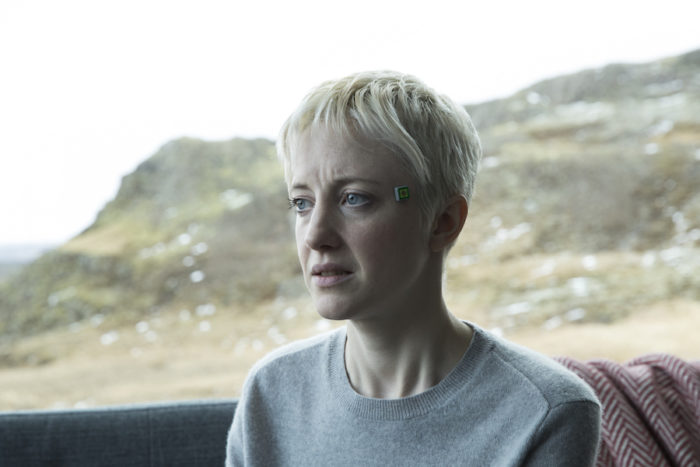Netflix UK TV review: Black Mirror Season 4, Episode 3 (Crocodile) – spoilers
Review Overview
Cast
8Conclusion
6David Farnor | On 01, Jan 2018
Warning: This contains spoilers for Crocodile. Not seen Episode 3 of Black Mirror Season 4? Read our spoiler-free review of the whole season.
“The world may think I’m foolish, they can’t see you like I can, oh, but anyone who knows what love is will understand.” That’s Irma Thomas’ Anyone Who Knows What Love Is (Will Understand), first released in 1964. It’s a song that we’ve heard several times in Black Mirror, as Charlie Brooker continues to slip it into the background of episodes – each one, perhaps, a callback to 15 Million Merits, the second episode of Season 1, when a young woman sings the track on a talent contest. Here, it’s on a car radio, in a street where a man gets hit by a self-driving pizza delivery van. Surely, a world with self-driving pizza vans can’t be all bad? But, of course, it can be. In fact, Crocodile is one of Black Mirror’s bleakest episodes yet.
The man being hit by the van echoes a similar accident that begins the tale, as Mia (Andrea Riseborough) and her boyfriend, Rob (Andrew Gower), accidentally hit and kill a man. He convinces her to cover it up and get rid of the body, and they part ways and move on with their separate lives. But just as Mia’s career as an architect is peaking, up pops Rob years later, who wants to put everything about his life back on track – and, as part of that, plans to come clean about the hit and run. She, though, doesn’t want him to – even if he keeps her out of it, she argues, they can still trace the incident back to her (more on that later). A heated argument later and she’s suffocating him on the floor of her hotel room, before hiding the body and renting an adult movie through the TV to give her an alibi.
It’s a steep descent into a nasty moral quagmire, graduating from accidental death to intentional murder – and Andrea Riseborough is perfectly cast in the role. Riseborough has always excelled at calm exteriors cracking and she manages to sell Mia’s speedy switch from guilt to desperate survival instinct with a steely resolve and barely contained (crocodile?) tears. Mia, of course, gets her comeuppance, but Crocodile’s tension comes from the way it slowly metes out that punishment, tipping us off to it before she can even sense it on the horizon.
That’s thanks to the episode’s second plot, which follows Shazia (Kiran Sonia Sawar), a kindly investigator for the insurance firm investigating that pizza vehicle crash. How fast was the pizza going? Is the pizza company liable for a faulty self-driving vehicle? And how much should the man hit by the van get in compensation? To find out, she uses a nifty little contraption: a small white box (with an old-school monitor – a nice touch) that can tap into people’s brains and extract their memories.
It’s familiar territory for Charlie Brooker, who has dabbled in similar tech in The Entire History of You – and even in White Christmas, his festive special following Season 2 (which also featured Irma Thomas’ Anyone). If that’s enough for you to dismiss Crocodile out of hand, don’t snap your attention jaws shut just yet, because there’s a whole interesting load of questions opened up by Shazia’s work. Brooker excels at building plausible worlds without long bursts of exposition, and this is no exception, as we discover that the memories recorded by the boxes aren’t always reliable: they can be shaped, trigged and influenced by such things as smell or taste. Shazia uses bottles of booze and – yes – the song Anyone to conjure up the mental image of the street with the car just outside a beer factory.
Anything private that her interviewees have done? It’s none of her business, she reassures, with the kind of kindly face that corporations and governments use to put a friendly front on something sinister or dangerous. And, sure enough, we also learn that people don’t have a choice in the matter: if they refuse to join in, Shazia has to notify the relevant authorities. Because why not take part, if you’ve got nothing to hide? In an age where our data and privacy are frequently sold to advertisers by platforms such as Google, Facebook and Twitter, the notion of an opt-out system is nothing new – and is exactly the kind of future rapidly coming a reality. Crocodile is a window onto a society where a presumption of innocence has become a presumption of compliance.
John Hillcoat is just the right person to helm such a story, his work on Lawless and The Road cementing his knack for both establishing an ominous atmosphere and building to shocking bouts of violence. Paced like a Nordic noir, with a tone reinforced by the chilling, jaw-dropping Icelandic landscape, Hillcoat’s camera gives us just enough of a glimpse of what’s coming around the bend for Mia, while driving slowly enough towards it that we have time to chew off our nails. It climaxes with a gentle conversation between the two women, as Shazia prods Mia’s mind for a recording of the crash, only for her other memories to spiral into a smorgasbord of homicide that pours out.
From that moment, both Shazia and Mia’s fates are sealed, and the messy denouement sees Mia follow her path to the brutally logical extreme, as she tries to erase any trace of Shazia’s discovery, starting with Shazia’s husband. Mia’s apparent decision to kill their child too feels like one nasty step too far from Brooker’s script, but the cop’s baffled reaction takes us right back to Irma’s song: anyone who knows what love is can’t understand Mia’s actions. If that’s par for the Black Mirror course, as it presents us with an alternate world where technology highlights humanity’s worst traits, it also means that the darkly wry reveal that the cops can still trace Mia using the memories of the family’s guinea pig sits a little uneasy – the balance between humour and horror is difficult to swallow, perhaps intentionally so. But as a story that raises intriguing questions about a world where memories have virtually become state or corporate property, Crocodile is a nightmarish thriller that lingers after its end credits. And not just because of the episode’s second earworm: Bugsy Malone’s upbeat closing number, which gleefully reminds us that we’re all gonna be remembered for the things that we say and do.
Black Mirror Season 4 is available on Netflix UK, as part of an £9.99 monthly subscription.


















